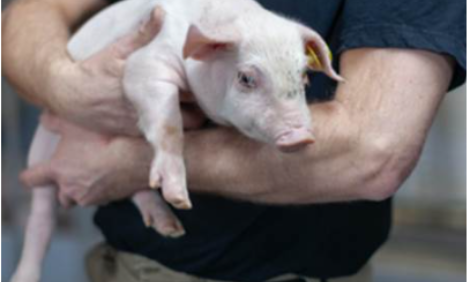



Use of Rapid In-Plant Screening Tests for Antibiotic Drug Residues in
By USDA FSIS, Notice 16-03. The purpose of this notice is to set out FSIS policies’ regarding the use of rapid in-plant screening tests for the detection of antibiotic drug residues in mature swine.II. Background
VMOs are to perform rapid in-plant antibiotic drug residue screening tests as part of the FSIS National Residue Program’s (NRP) enforcement testing. The mature swine to be selected for testing are those presented for antemortem or postmortem inspection that appear to have disease conditions or lesions that, in the VMO’s professional assessment, may indicate that the animal was treated with antibiotics.
NOTE: For residue sampling, FSIS defines “mature swine” as swine over 6 months of
age that weigh over 300 pounds.
The Swab Test on Premises (STOP) screen for antibiotic residues in the kidneys of mature swine is the only test available for use in establishments that slaughter this class of animals. FSIS has trained all VMOs on how to collect samples and perform the STOP screening test. VMOs with questions about sample collection or the STOP test should contact the Technical Service Center.
III. Responsibilities
A. What are the symptoms and conditions that may warrant the collection of
samples?
The following is a list of symptoms and conditions that may warrant collection the
of samples for rapid in-plant antibiotic drug residue screening.
- Antemortem
- Downers. Animals that are non-ambulatory.
- Septicemia/generalized disease. Animals exhibiting any of the following conditions: depression, an elevated or subnormal body temperature, hyperemic skin, congested mucous membranes, dehydration, or poor body condition, in association with an injury or inflammatory condition.
- Injury or inflammatory conditions such as abscesses, arthritis, pneumonia, mastitis, metritis, or diamond skin.
- Downers. Animals that are non-ambulatory.
- Postmortem
- Animals that are identified during antemortem inspection as U.S. suspects for antibiotic drug residues.
- Carcasses that are condemned for septicemia/pyemia.
- Carcasses with lesions suggestive of injection sites.
- Diamond skin or other skin conditions associated with septicemia.
- Pneumonia/pleuritis.
- Pericarditis/endocarditis.
- Nephritis/cystitis.
- Metritis.
- Mastitis.
- Peritonitis.
- Arthritis.
- Animals that are identified during antemortem inspection as U.S. suspects for antibiotic drug residues.
B. What should a Veterinary Medical Officer (VMO) do when performing a rapid in-plant residue screening test?
- All carcasses sampled for NRP enforcement testing are to be retained until
the results of the screening test are obtained.
- VMOs should prepare for traceback of the animal by asking the establishment to provide any information they have on the source of the hog.
IV. Results
A. What should VMOs do with the results of the rapid in-plant screening tests?
- If the rapid in-plant antibiotic screening test result is negative, inspection program personnel are to release the carcass and parts.
- If the rapid in-plant residue screening test result is positive, inspection program personnel are to continue to retain the carcass and parts, and submit appropriate tissue samples (liver, kidney, and muscle tissue) for further testing to a FSIS Food Service Laboratory (FSL).
- If the test results from the FSIS FSL are negative for violative levels of antibiotic residues, inspection program personnel are to release the carcass and parts.
- If the test results from the FSIS FSL show violative levels of antibiotic residues, inspection program personnel are to condemn those parts or the carcass that are represented by the sample.
- If the test results from the FSIS FSL are negative for violative levels of antibiotic residues, inspection program personnel are to release the carcass and parts.
NOTE: FSIS is requesting that VMOs collect samples for the NRP enforcement testing even after a carcass is condemned because the use of veterinary drugs above the established limits and the use of prohibited veterinary drugs are violations of Federal law.
The violator is subject to regulatory action by the Food and Drug Administration as well as being listed on the FSIS Residue Information Center’s repeat violators list. Therefore, at the time a VMO performs an in-plant rapid screening test on a condemned carcass, he or she is to collect the appropriate tissue samples before the establishment disposes of the carcass and parts. This is necessary so that the tissue samples can be submitted to the FSIS FSL if the result of the in-plant rapid screening test is positive.
Printable version
For a printable version click here (3 page PDF)
Source: - USDA Food Safety and Inspection Service - FSIS Notice - 5/16/03- 16th May 2003








